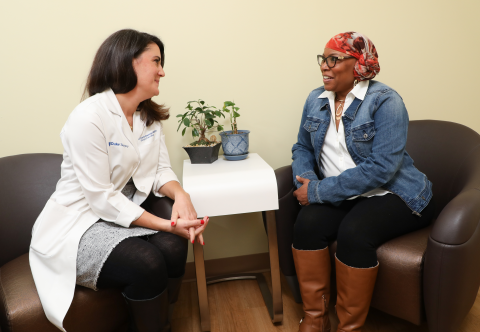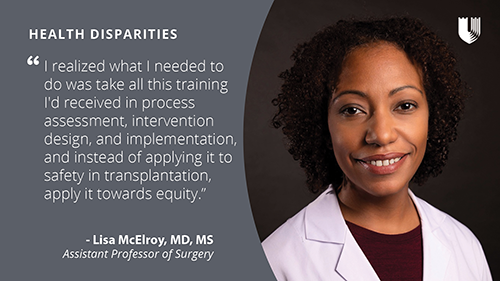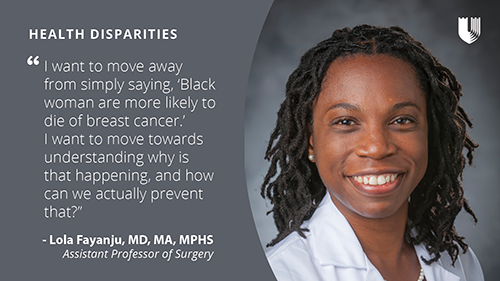
Photo above: Dr. Rachel Greenup holds a consultation with a patient regarding financial options for treatment (Pre-COVID-19)
With tens of millions of Americans currently unemployed, a raging global pandemic affecting races disproportionately, and a widespread national acknowledgment of deeply rooted racial inequities, health disparities have transitioned from widely misunderstood to a trending topic in health care. For Oluwadamilola Fayanju, MD, MA, MPHS, Rachel Greenup, MD, MPH, and Lisa McElroy, MD, MS, studying the impact of health disparities is hardly a new undertaking. Their research careers have focused on defining and dismantling disparities in healthcare across a variety of specialties.
Overcoming Bias
Dr. McElroy, Assistant Professor of Surgery in the Division of Abdominal Transplant, found her path to this field of research organically, a natural next step to her personal experiences in medicine. As a surgeon drawn to the complexity of care required in transplant, Dr. McElroy spent several years earning a master's in health services and outcomes research, and she focused her work on looking at processes and systems of care to improve safety. She soon found a more dire need.

A turning point for Dr. McElroy occurred during her clinical fellowship when she encountered a patient who was unable to successfully complete the transplant evaluation process due to social barriers. Though transplant candidacy is determined primarily by medical illness, the ability to get added to the waitlist also requires a strong social network and significant personal resources. “Minorities and patients with low income and education levels,” Dr. McElroy says, “have a much lower rates of successful access to transplant.”
“My perspective is a little unique,” she adds. “Partly because I am a Black woman from a low socioeconomic background myself and that demographic is not well represented in transplant surgery, but also partly because of my training in healthcare process and organizational assessment.”
Only nine Black women are currently practicing abdominal transplant surgery in the United States, and research in other fields has recently demonstrated a lack of representation can influence processes of care and contribute to disparities.
“I think there were things I was seeing that weren't as obvious to other members of our team, but I was overwhelmed by it. A lot of research has been done into barriers faced by patients as they attempt to gain access to transplant, but much less work has been done about the systems and processes of care and the way they can make it easier or harder for patients who lack resources to achieve successful transplantation. I realized what I needed to do was take all this training I'd received in process assessment, intervention design, and implementation, and instead of applying it to safety, apply it towards equity.”
Now, Dr. McElroy researches how transplant centers can influence healthcare disparities by improving processes of care.
Inequitable Resources
Similar to Dr. McElroy’s experience, Dr. Greenup was called to action when she encountered firsthand the disparities in care that negatively affected patient outcomes.
“When I entered the world of oncology, it was compelling that little attention was paid to resource allocation,” says Dr. Greenup. “We are willing to over-treat individuals who can pay, yet often under-treat those cannot afford cancer screening and treatment.”
Affordability of care is a primary focus of Dr. Greenup’s research. Financial toxicity—the burden of direct and indirect healthcare costs to patients and caregivers—often presents roadblocks to patients pursuing high-quality care. Additionally, implicit biases that exist in care, such as those Dr. McElroy witnessed in candidate selection for transplant, draw an even clearer line between those who receive care, and those who don’t.
Social Risk Factors
Defining existing health disparities is a crucial first step, but dismantling them is a far greater challenge. It involves confronting centuries of systemic inequities that pervade all aspects of society, far beyond medicine.

Dr. Fayanju, Assistant Professor of Surgery in the Division of Surgical Oncology, says that a more holistic approach is critical to providing equitable care.
“I want to move away from simply saying, ‘Black woman are more likely to die of breast cancer,’” says Dr. Fayanju. “I want to move towards understanding why is that actually happening, and how can we actually prevent that?”
While the disproportionate prevalence of some disease-related risk factors among people of color do contribute to some of the health disparities that are observed, these factors aren’t the primary causes of health inequity. Dr. Fayanju’s NIH-funded research examines modifiable risk factors for those at risk for disparate care. With appropriate resources, social determinants of health can be mitigated, and addressing them has the potential for better patient outcomes.
“When you first see a patient, you need to think about everything that led to that moment,” says Dr. Fayanju, “starting from childhood, starting from access to healthy food, starting with not being exposed to environmental contributors, with having the financial resources to get an education and have good health insurance and a job that can provide it, if they are getting screened for preventable diseases. All these kinds of things lead up to the moment of meeting a physician.”
The COVID-19 Crisis
In a healthcare landscape redefined by the coronavirus, the game has changed once again, and obstacles to care are even greater.
“The study of health inequities and disparities is especially pertinent in the midst of the COVID-19 global pandemic,” says Dr. Greenup, “High rates of pandemic-related job loss have resulted in Americans losing employer-based health insurance. Not only will people lose employment, they will also lose access to affordable healthcare.”
Dr. McElroy adds that though the pandemic has spurred many to action, it has been a taxing experience on everyone.
“The pandemic is a global event that is weighing on the consciousness and day-to-day life of all of us,” says Dr. McElroy. “You can't discount that. I don't know anyone who has not been affected by this.”
The coronavirus pandemic is, in a sense, bringing to light disparities in care on a broader and more public scale. If anything, this public recognition of long-existing problems will offer a stronger chance at finding practical solutions.
Give to Duke Surgery
A gift to the Department of Surgery is a gift of knowledge, discovery, and life.